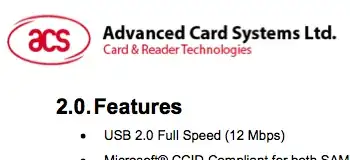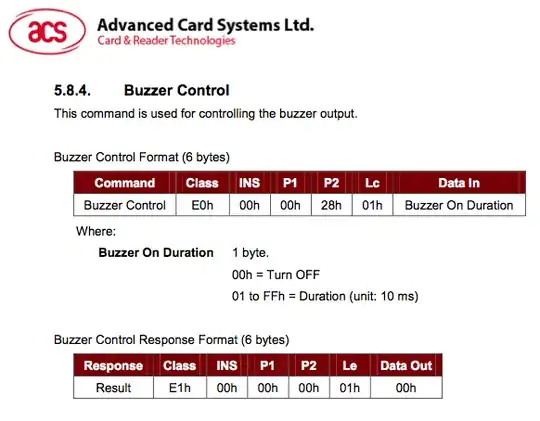I'm using a ACS ACR1252U card reader (http://www.acs.com.hk/en/products/342/acr1252u-usb-nfc-reader-iii-nfc-forum-certified-reader/) connected via USB and to be honest I have no idea how to get it working. I've Googled a ton of stuff but no luck. The following is more or less what I've done:
I get the following using dmesg:
[ 7173.059710] usb 1-1.3: new full-speed USB device number 6 using dwc_otg
[ 7173.160500] usb 1-1.3: not running at top speed; connect to a high speed hub
[ 7173.163114] usb 1-1.3: New USB device found, idVendor=072f, idProduct=223b
[ 7173.163147] usb 1-1.3: New USB device strings: Mfr=1, Product=2, SerialNumber=0
[ 7173.163168] usb 1-1.3: Product: ACR1252 Dual Reader
[ 7173.163186] usb 1-1.3: Manufacturer: ACS
I used the following Python code to get more details about the devices:
#!/usr/bin/python
import sys
import usb.core
# find USB devices
dev = usb.core.find(find_all=True)
# loop through devices, printing vendor and product ids in decimal and hex
for cfg in dev:
print cfg
sys.stdout.write('Decimal VendorID=' + str(cfg.idVendor) + ' & ProductID=' + str(cfg.idProduct) + '\n')
sys.stdout.write('Hexadecimal VendorID=' + hex(cfg.idVendor) + ' & ProductID=' + hex(cfg.idProduct) + '\n\n')
The output for this specific device is:
DEVICE ID 072f:223b on Bus 001 Address 004 =================
bLength : 0x12 (18 bytes)
bDescriptorType : 0x1 Device
bcdUSB : 0x200 USB 2.0
bDeviceClass : 0x0 Specified at interface
bDeviceSubClass : 0x0
bDeviceProtocol : 0x0
bMaxPacketSize0 : 0x40 (64 bytes)
idVendor : 0x072f
idProduct : 0x223b
bcdDevice : 0x100 Device 1.0
iManufacturer : 0x1 ACS
iProduct : 0x2 ACR1252 Dual Reader
iSerialNumber : 0x0
bNumConfigurations : 0x1
CONFIGURATION 1: 200 mA ==================================
bLength : 0x9 (9 bytes)
bDescriptorType : 0x2 Configuration
wTotalLength : 0xb1 (177 bytes)
bNumInterfaces : 0x2
bConfigurationValue : 0x1
iConfiguration : 0x0
bmAttributes : 0x80 Bus Powered
bMaxPower : 0x64 (200 mA)
INTERFACE 0: Smart Card ================================
bLength : 0x9 (9 bytes)
bDescriptorType : 0x4 Interface
bInterfaceNumber : 0x0
bAlternateSetting : 0x0
bNumEndpoints : 0x3
bInterfaceClass : 0xb Smart Card
bInterfaceSubClass : 0x0
bInterfaceProtocol : 0x0
iInterface : 0x4 ACR1252 Dual Reader PICC
ENDPOINT 0x1: Bulk OUT ===============================
bLength : 0x7 (7 bytes)
bDescriptorType : 0x5 Endpoint
bEndpointAddress : 0x1 OUT
bmAttributes : 0x2 Bulk
wMaxPacketSize : 0x40 (64 bytes)
bInterval : 0x0
ENDPOINT 0x81: Bulk IN ===============================
bLength : 0x7 (7 bytes)
bDescriptorType : 0x5 Endpoint
bEndpointAddress : 0x81 IN
bmAttributes : 0x2 Bulk
wMaxPacketSize : 0x40 (64 bytes)
bInterval : 0x0
ENDPOINT 0x84: Interrupt IN ==========================
bLength : 0x7 (7 bytes)
bDescriptorType : 0x5 Endpoint
bEndpointAddress : 0x84 IN
bmAttributes : 0x3 Interrupt
wMaxPacketSize : 0x40 (64 bytes)
bInterval : 0xa
INTERFACE 1: Smart Card ================================
bLength : 0x9 (9 bytes)
bDescriptorType : 0x4 Interface
bInterfaceNumber : 0x1
bAlternateSetting : 0x0
bNumEndpoints : 0x3
bInterfaceClass : 0xb Smart Card
bInterfaceSubClass : 0x0
bInterfaceProtocol : 0x0
iInterface : 0x5 ACR1252 Dual Reader SAM
ENDPOINT 0x2: Bulk OUT ===============================
bLength : 0x7 (7 bytes)
bDescriptorType : 0x5 Endpoint
bEndpointAddress : 0x2 OUT
bmAttributes : 0x2 Bulk
wMaxPacketSize : 0x40 (64 bytes)
bInterval : 0x0
ENDPOINT 0x82: Bulk IN ===============================
bLength : 0x7 (7 bytes)
bDescriptorType : 0x5 Endpoint
bEndpointAddress : 0x82 IN
bmAttributes : 0x2 Bulk
wMaxPacketSize : 0x40 (64 bytes)
bInterval : 0x0
ENDPOINT 0x83: Interrupt IN ==========================
bLength : 0x7 (7 bytes)
bDescriptorType : 0x5 Endpoint
bEndpointAddress : 0x83 IN
bmAttributes : 0x3 Interrupt
wMaxPacketSize : 0x40 (64 bytes)
bInterval : 0xa
Decimal VendorID=1839 & ProductID=8763
Hexadecimal VendorID=0x72f & ProductID=0x223b
I installed PyUSB and I'm able to detect the device using some of the sample code, but nothing like reading the NFC card when it comes into proximity (although there is a beeping sound, which makes me believe the USB device itself is working fine).
I also installed libacsccid1 package which says it supports this device https://github.com/acshk/acsccid, but I don't know exactly how to use this.
Besides that, I don't know what else to do. Any help will be greatly appreciated. The goal of my project is to control a GPIO output dependent on the value of the NFC tag detected.
--- Update ---
I've worked a bit more and although I still can't get it working, I have more data. Specifically I'm working off of this: http://www.digitalmihailo.com/usb-programming-with-python-on-linux-pyusb-version/
From the datasheets I can confirm it's a USB 2.0 full speed device:
For testing, I just want to make the buzzer sound. Here's the screenshot of the device's API doc for this functionality:
So, a simplified version of http://www.digitalmihailo.com/usb-programming-with-python-on-linux-pyusb-version/ for my device would be:
#!/usr/bin/python
import os
import sys
import time
import usb.core
import usb.util
# According to what I've read, full speed USB is 64 byte packet size.
packet_len = 64
# Packing a request.
# Packets are 64 bytes long, most of the commands are 4 bytes long. So up to 18
# can be batched into a packet. For example command with bytes [0x94, 0x0, 0x0, 0x0] is getting firmware id
def pack_request(*arguments):
packet = [0x0] * packet_len
i = 0
for arg in arguments:
packet[i] = arg
i += 1
#packet[0:4] = [0x94, 0x0, 0x0, 0x0] #get firmware id
return ''.join([chr(c) for c in packet])
def main():
#Updated for the ACS ACR1252U
dev = usb.core.find(idVendor=0x72f, idProduct=0x223b)
# was it found?
if dev is None:
raise ValueError('Device not found')
try:
dev.detach_kernel_driver(0)
except: # this usually mean that kernel driver has already been dettached
pass
# ACS ACR1252U only has 1 configuration
dev.set_configuration()
# Interface 0: Dual Reader PICC. This is what we want
# Interface 1: Dual Reader SAM
try:
dev.set_interface_altsetting(0)
except usb.core.USBError:
print 'Error setting interface!'
pass
# According to the API, to sound the buzzer we must send:
#
# Class: 0xe0
# INS: 0x00
# P1: 0x00
# P2: 0x28
# Lc: 0x01
# DataIn (duration): 0xff (for 255 * 10ms = 2.55 seconds)
raw = pack_request(0xe0, 0x00, 0x00, 0x28, 0x01, 0xff)
#send the packet
# Params are (endpoint, data, timeout)
#
# According to the script output:
# ENDPOINT 0x01: Bulk OUT
dev.write(endpoint=0x01, data=raw)
#done
if __name__ == '__main__':
main()
When I run this nothing happens... no buzzer, no error message. What could be wrong here?
Thanks!

